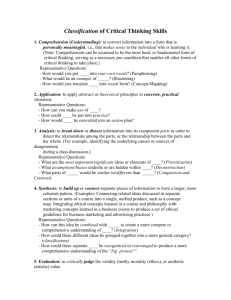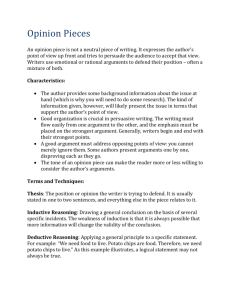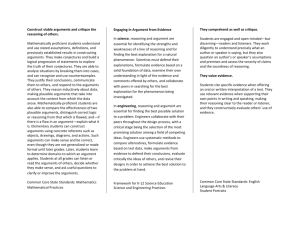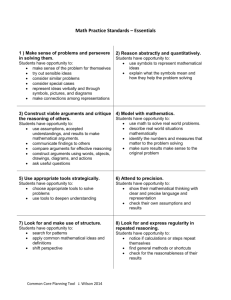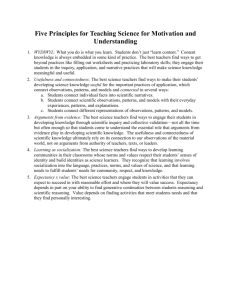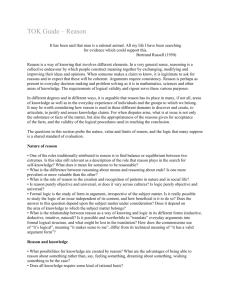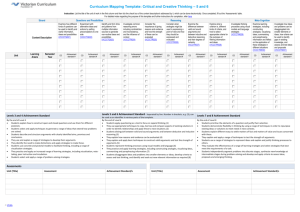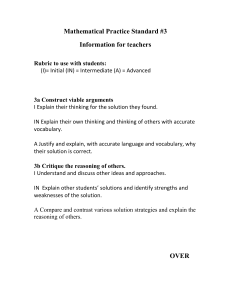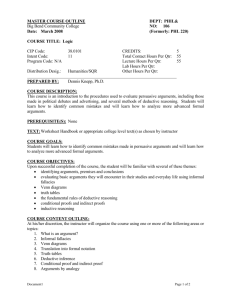Deep Thinking Discussion Prompts
advertisement
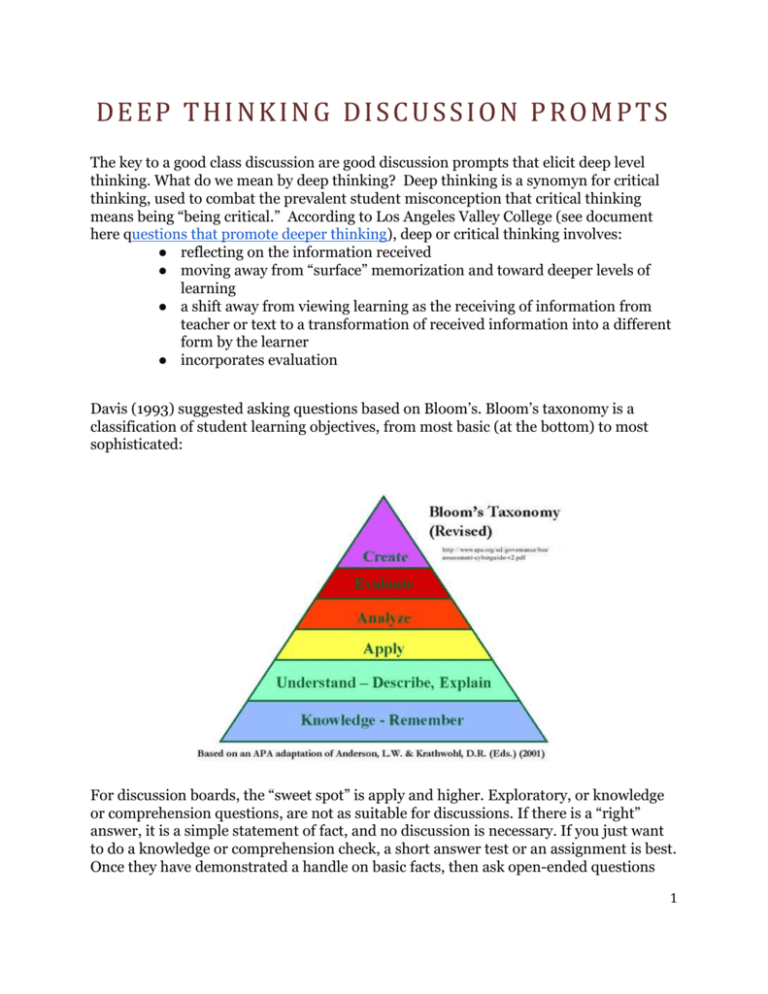
DEEP THINKING DISCUSSION PROMPTS The key to a good class discussion are good discussion prompts that elicit deep level thinking. What do we mean by deep thinking? Deep thinking is a synomyn for critical thinking, used to combat the prevalent student misconception that critical thinking means being “being critical.” According to Los Angeles Valley College (see document here questions that promote deeper thinking), deep or critical thinking involves: ● reflecting on the information received ● moving away from “surface” memorization and toward deeper levels of learning ● a shift away from viewing learning as the receiving of information from teacher or text to a transformation of received information into a different form by the learner ● incorporates evaluation Davis (1993) suggested asking questions based on Bloom’s. Bloom’s taxonomy is a classification of student learning objectives, from most basic (at the bottom) to most sophisticated: For discussion boards, the “sweet spot” is apply and higher. Exploratory, or knowledge or comprehension questions, are not as suitable for discussions. If there is a “right” answer, it is a simple statement of fact, and no discussion is necessary. If you just want to do a knowledge or comprehension check, a short answer test or an assignment is best. Once they have demonstrated a handle on basic facts, then ask open-ended questions 1 that require divergent thinking (i.e., questions that allow for a variety of possible answers and encourage students to think at a deeper level) at Bloom’s level Apply and higher. 1) Application: To apply abstract or theoretical principles to concrete, practical situations a) What examples can you find of ______ in song lyrics? b) If you were interviewing ______, what questions would you ask to get a better understanding of ________? c) Would ______have happened in ______ [alternative context]? d) How could ______ be put into practice at Cal Lutheran? e) How would ______be converted into an action plan? 1) Analysis: Probe motives or causes. To break down or dissect information into its component parts in order to detect the relationship among the parts or the relationship between the parts and the whole. a) What do you think motivated ______? b) What was the relationship between _________? c) How do you interpret ________? d) What are the most important/significant ideas or elements of _____? (Prioritization) e) What assumptions/biases underlie or are hidden within ____? (Deconstruction) f) What parts of _____would be similar to/different than _______? (Comparison-and-Contrast) 2) Synthesis: to build up or connect separate pieces of information to form a larger, more coherent pattern. a) What changes would you make to _______ to solve _______? b) What conclusions can you draw from _______? c) How can this idea be combined with ________ to create a more complete or comprehensive understanding of _________? (Integration) d) How can these different ideas be grouped together into a more general category? (Classification) e) How can these separate _________ be reorganized or rearranged to produce a more comprehensive understanding of the “big picture?” 3) Evaluation: to critically judge the validity (truth), morality (ethics), or aesthetic (artistic) value of ideas, data, or products by using relevant assessment criteria (standards for judging quality). a) What choice would you have made after ________? b) If you were judging at ______’s trial, what would they be most likely to be convicted of? Would you declare them guilty or innocent? Why? c) How would you judge the accuracy or validity of _________? d) How would you evaluate the ethical (moral) implications or consequences of ________? 2 e) How would you rate the aesthetic quality (beauty) of ___________? 4) Create: to generate imaginative ideas, unique perspectives, innovative strategies, or novel (alternative) approaches to traditional practices. a) Propose a plan to solve ________? b) Formulate your own theory for why ______ occurred? c) What could be invented to _______________? d) What might happen if ______________? (hypothetical reasoning) But you don’t have to limit yourself to Bloom’s; there are a lot of specific deep thinking skills you can target with your discussion questions/prompts: 1) Deduction: to draw conclusions about particular instances that are logically consistent with or derive from general principles and premises. a) What specific conclusions can be drawn from this general __________? b) If this general ________ were true, then it would logically follow that ___________. c) What particular actions or practices would be consistent with this general ______________? 2) Induction: to infer (derive or draw out) well-reasoned generalizations or principles from individual instances or specific examples. (For example, identify recurrent themes or categories that emerge during a class discussion.) a) What are the broader implications of _________? b) What patterns or themes emerge from _________? c) What can be extrapolated or extended from this particular ________ that may have more general or universal value? 3) Adduction: to make a case for an argument or position by accumulating supporting evidence in the form of logical arguments (rational thinking) or research evidence (empirical reasoning). a) What proof exists for ____________? b) What are logical arguments for ______________? c) What research evidence supports ______________? 4) Refutation: to make a case against an argument or position by accumulating contradictory evidence in the form of logical arguments (rational thinking) or research findings (empirical reasoning). a) What proof exists that ___________ is false? b) What are logical arguments against ______________? c) What research evidence contradicts _______________? 3 5) Balanced Thinking: to carefully consider arguments/evidence for and against a particular position or viewpoint. a) What are the strengths/advantages and weaknesses/disadvantages of _____________? b) What evidence supports and contradicts ________________? c) What are arguments for and counterarguments against ______________? 6) Multiple Perspective-Taking: to view an issue from a variety of viewpoints, standpoints, or positions in order to gain a more comprehensive and holistic understanding. a) How would people from different ethnic or racial groups view this ________? b) How would people from different socioeconomic backgrounds be affected by ________? c) How would people who differ in age or gender react to _________? 7) Causal Reasoning: to identify cause-effect relationships between different ideas or actions. a) How would you explain why ___________ occurred? b) What is responsible for _____________? c) How would _____________ affect or influence ___________? 8) Ethical Reasoning: to identify what is morally right/ wrong or good/bad about particular ideas, attitudes, or practices. a) What does ____________say about a person’s values? b) What are the moral implications of _____________? c) Are the expressed or professed convictions of _______________ consistent with actual commitments and observable actions? Not only can questions vary based on soliciting deep levels of thought, so can the types of discussion activities (Adapted from The Tools for Successful Online Teaching by Lisa Dawley, 2007): ● Scavenger hunt ○ Students find something online or in real life, take a screenshot or photo or link to it, and discuss what it is and why it is relevant ● Role play ○ Students take on different roles and interact based on those roles ● Student moderators ○ Rotating students moderate the discussion board ● Student synthesizers ○ Rotating students synthesis the main points of the discussion board ● Opinion assessment 4 ● ● ● ● ● ● ○ Students write their initial opinion or feelings on a topic before they have done any research. They then research alternative perspectives or evidence on their topic or another student’s. They post that evidence in response to the original post, and comment on whether they changed their mind Debate ○ Select 2 students or 2 teams to present 2 sides of an issue, then rest of their group/students decide who “won” the argument and why Ask an expert ○ Have an expert be a guest participant in a discussion board where the students then have to ask them questions on their area of expertise Reflection ○ Have students discuss a project for the class they are working on; what is hard about it, what strategies they are using Polling ○ Each student creates a novel question. Once questions have been refined with help of instructor; then every student answers all the questions Virtual field trip ○ Have students research a site, then describe it like a tour guide Jigsaw Groups ○ Students break apart a single topic into parts, then discuss and report to each other on those parts ○ Create a shared report on the entire topic 5
